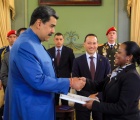On September 15, 2012, United States President Barack Obama released the Presidential Determination on Major Illicit Drug Transit and Major Illicit Drug Producing Countries for 2012. As required by the United States’ Foreign Relations Authorization Act (FRAA), the annual release of the U.S. Presidential Majors List identifies countries determined to be a major drug transit country and/or a major illicit drug producing country and must designate each majors list country, if any, that has “failed demonstrably, during the previous 12 months, to make substantial efforts” to adhere to its obligations under international counternarcotics agreements and to take certain other counternarcotics measures.
In the Presidential Determination, The Bahamas was identified as a major drug transit or major illicit drug producing country. However, a country’s presence on the major’s list is not necessarily an adverse reflection of its government’s counternarcotics efforts or level of cooperation with the United States. The United States enjoys close collaboration with The Bahamas on counternarcotics and citizen security. The Bahamas’ inclusion on this list reflects the ongoing challenge it faces in combating transnational organized crime, and highlights the need for continued bilateral support to counter this regional threat.
The United States and the Government of the Commonwealth of the Bahamas (GCOB) has been a stalwart ally against illegal narcotics trafficking and is an important partner in the Caribbean Basin Security Initiative (CBSI). In 2011, The Bahamas’ drug enforcement unit cooperated closely with United States and other foreign law enforcement agencies on drug investigations through Operation Bahamas, Turks and Caicos (OPBAT). These efforts contributed to the seizure of 176 kilograms (kg) of cocaine and the seizure of 24 metric tons of marijuana by Bahamian authorities in 2011.
The United States has a Comprehensive Maritime Agreement (CMA) with The Bahamas, which provides for cooperation in counternarcotics operations in and around Bahamian territorial waters, including the use of ship riders and expedited boarding authorizations and procedures. This agreement was utilized often in 2011, showcasing the Bahamian government’s strong commitment to U.S. and joint counternarcotics efforts.





